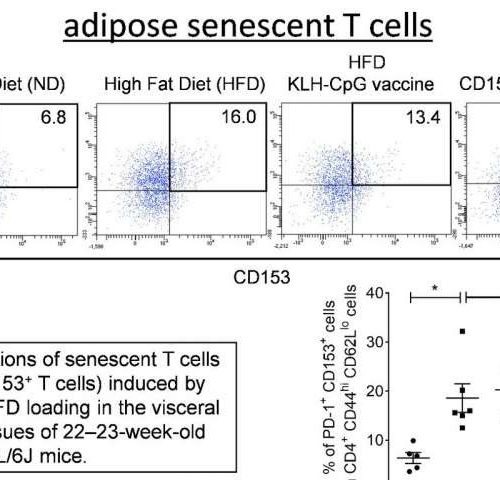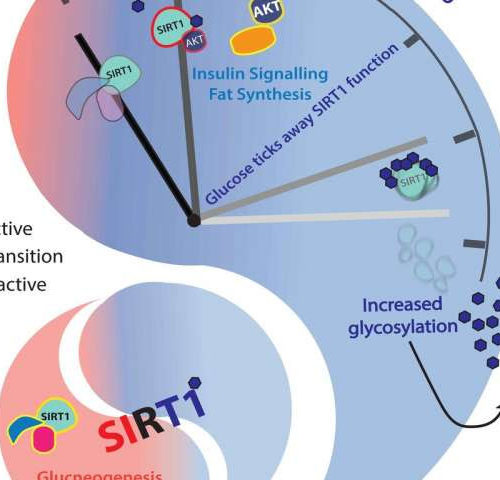by Osaka University were defined as PD-1+ CD153+ cells in CD4+ T cells. The proportion of senescent T cells in visceral adipose tissues (VAT) of the high fat diet (HFD) control group was significantly increased compared with that in the VAT of the normal diet (ND) control group. CD153-CpG vaccination of HFD mice resulted in...
Tag: <span>Glucose</span>
Glucose acts as a double edged sword on longevity factor SIRT1
by Tata Institute of Fundamental Research Feeding and fasting cycles exert control over metabolism and energy utilization. Aberrations are known to cause metabolic diseases, liver dysfunctions and accelerated aging. Expression and activity of the anti-aging factor SIRT1 has long been known to be beneficial in mitigating diseases such as diabetes, cardiovascular dysfunctions, neurodegeneration, cancer and...
Artificial pancreas system better controls blood glucose levels than current technology
NIH-funded study based at CU Anschutz and other centers show safety, efficacy benefits for people with type 1 diabetes UNIVERSITY OF COLORADO ANSCHUTZ MEDICAL CAMPUS AURORA, Colo. (Oct. 17, 2019) – A multicenter randomized clinical trial evaluating a new artificial pancreas system — which automatically monitors and regulates blood glucose levels — has found that...
It’s not just insulin: Diabetes patients struggle to get crucial supplies
by Bram Sable-Smith In the first three months after getting his Dexcom continuous glucose monitor, Ric Peralta said, he reduced his average blood sugar level by 3 percentage points. “It took me from not-very-well-managed blood sugar to something that was incredibly well managed,” said Peralta, a 46-year-old optician in Whittier, Calif., who was diagnosed with...
The brain’s amyloid buildup is not a powerful indicator of Alzheimer’s disease
Posted Today While the presence of beta-amyloid plaques in the brain may be a hallmark of Alzheimer’s disease, giving patients an amyloid PET scan is not an effective method for measuring their cognitive function, according to a new study from researchers in the Perelman School of Medicine and Thomas Jefferson University. The researchers concluded that...
Deleting Old Cells
Posted Today This news or article is intended for readers with certain scientific or professional knowledge in the field. New research from Harvard Medical School researchers at Joslin Diabetes Center has shown that insulin resistance in mice increases the proportion of dysfunctional aged beta cells. Such an increase in aged beta cells could lead to type 2 diabetes. The...
Dapagliflozin improves glucose outcomes in type 1 diabetes
Chantal Mathieu, M.D., PhD., from the University of Leuven in Belgium, and colleagues assessed continuous glucose monitoring in patients with inadequately controlled type 1 diabetes (hemoglobin A1c [HbA1c] ≥7.7 to ≤11 percent) who received dapagliflozin as an adjunct to adjustable insulin as part of two phase 3 clinical trials. Pooled data included 1,591 patients receiving dapagliflozin 5 mg (530 patients), dapagliflozin 10 mg (529), or placebo (532). The...
Time-restricted eating shows benefits for blood glucose
UNIVERSITY OF ADELAIDE By restricting the time period during which they could eat, researchers have seen promising results for controlling blood glucose levels in men at risk of type 2 diabetes. In a small study now published in the journal Obesity, researchers from the University of Adelaide and the South Australian Health and Medical Research Institute (SAHMRI) assessed the effects of time-restricted eating (TRE)...
Protein released from fat after exercise improves glucose
It’s well-known that exercise improves health, but understanding how it makes you healthier on a molecular level is the question researchers at Joslin Diabetes Center are answering. Image: Laurie J. Goodyear, Ph.D., Section Head and Senior Investigator at Joslin Diabetes Center, and Professor of Medicine at Harvard Medical School. Credit: John Soares After performing experiments...
How does exercise prompt fat to benefit metabolism?
An international team of scientists has uncovered molecular evidence of how exercise benefits metabolism and health through its effect on fat. The evidence reveals that fat plays an active role in the process. The finding follows earlier work in which the researchers were the first to show that exercise prompts fat tissue to release molecules that...


